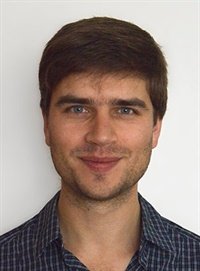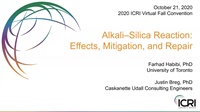Alkali-Silica Reaction: Cause, Effects, Mitigation, and Repair
Total Credits: 0.5 PDH
- Categories:
- Technical Presentations
- Presenters:
- Dr. Farhad Habibi, PhD | Justin Breg, PhD
- Duration:
- 36 Minutes
- Format:
- Audio and Video
- License:
- Access for 6 month(s) after purchase.
Tags: 2020 Fall Convention
Description
Alkali-Silica Reaction (ASR) can cause significant damage to concrete structures including bridges, roadways, airport runways, and nuclear power plants. When reactive aggregates are included in a mix, the presence of moisture initiates a reaction between the alkaline cement paste and reactive amorphous silica. The result is a gel that continues to dilate, which may cause cracks in the concrete mass.
A research program was undertaken at the University of Toronto with the sponsorship of the Canadian Nuclear Safety Commission (CNSC) to investigate the effects of ASR on large-scale and small-scale concrete specimens. Several specimens were constructed using reactive (ASR) concrete and non-reactive (regular) concrete, and their short-term and long-term structural and mechanical behavior were compared. To accelerate the deterioration of concrete, wall specimens were stored in an environmental chamber, specially constructed with the capacity to store large specimens in controlled high-temperature and high-humidity conditions.
In this presentation, we will discuss the results of the research program, will offer best practices to minimize the risk of ASR in concrete during placement, and will propose several strategies for repair of structures that have been degraded due to ASR.
Learning Objectives:
- Understand the cause of ASR
- Understand the effects of ASR on concrete properties and durability
- Learn best practices for minimizing risk of ASR
- Become familiar with strategies for remediating structures affected by ASR
Presenter

Dr. Farhad Habibi, PhD Related Seminars and Products
Structural Engineer
Univeristy of Toronto
Farhad holds a PhD in Civil Engineering from the University of Toronto, and is currently an EIT. His primary focus is on reinforced concrete. Farhad’s interests also include seismic and dynamic analysis, finite element analysis, failure analysis, non-destructive testing methods, monitoring and evaluating life expectancy of structures, and assessment of construction materials.
Prior to joining Caskanette Udall Consulting Engineers, Farhad worked for the University of Toronto as a research assistant and instructor for many engineering courses. During his research, he collaborated with the Canadian Nuclear Safety Commission (CNSC) to investigate the performance of shear walls affected by Alkali-Silica Reaction (ASR) under seismic loading.

Justin Breg, PhD Related Seminars and Products
Caskanette Udall Consulting Engineers
Justin Breg consults in the fields of structural design and analysis, forensics, and building science. He holds a PhD in Civil Engineering from the University of Waterloo. His research background covers a broad range of topics, including micromechanics of concrete, renovation of historic structures, and building in extreme climates.
Justin teaches at the University of Waterloo, on subjects related to Advanced Structures, Building Science, and Building Construction.
